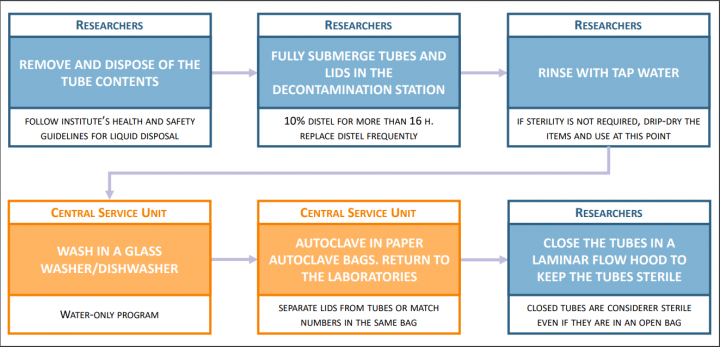Developing new research practices for sustainability
New article documents an 11-week study to improve the sustainability of lab protocols and reduce lab running costs.
In 2020, a group of LBEP scientists gained some media traction after challenging the sustainability of standard microbiology wet lab practices in their article “A case report: insights into reducing plastic waste in a microbiology laboratory”. Led by Amy Pickering and Joana Alves, LBEP wet lab scientists sought to identify sustainable alternatives for the single-use plastics required by many lab protocols.
We knew that we were using plastic daily in our research, but it wasn't until we took the time to quantify the waste that the volumes being used really hit home. That really emphasised the need for us to introduce plastic-reducing measures.
Read the article abstract here:
"Single-use plastics have often replaced more sustainable materials in microbiology laboratories. Keeping in mind that one of the objectives of the United Nations Sustainable Development Goals is responsible consumption and production, we wanted to document how many single-use plastic items could be saved by taking reduction and reuse approaches in a microbiology laboratory. After taking 4 weeks to document the baseline levels of single-use plastic waste being generated in our laboratory and identifying ways to reduce our reliance on them, we implemented various reduction and reuse approaches and then documented our plastic use over a 7-week period. Reduction approaches included moving to sustainable materials, such as reusable wooden sticks for patch plating and metal loops for inoculation. Reuse approaches focused on reusing plastic tubes via a chemical decontamination station and autoclaving, facilitating the reduction of single-use plastics and a decrease in the amount of waste generated. By utilizing reduction and reuse strategies, which could be implemented in other microbiology laboratories, substantial single-use plastic savings were achieved. These savings had an impact on the amount of biohazard waste being autoclaved and incinerated, as well as generating substantial cost savings for the research institute. The reductions in waste documented in this study could act as a benchmark for others wanting to implement the changes described."

The protocols can be found on the Access Microbiology website (doi:10.1099/acmi.0.000173).
For more information, you can find the paper in this link: https://www.microbiologyresearch.org/content/journal/acmi/10.1099/acmi.0.000173
Full Citation:
Alves J, Sargison F, Stawarz H, Fox W, García Huete S, Hassan A, McTier B & Pickering A. 2020. Access Microbiology. DOI: https://doi.org/10.1099/acmi.0.000173
Media Attention:
The sustainability effort was referred to in several news articles, including:
https://nen.press/2020/10/18/does-science-have-a-plastic-problem/
https://www.technologytimes.pk/2020/10/15/microbiologists-take-steps-in-lab-to-reduce-plastic-waste/
https://www.sciencedaily.com/releases/2020/10/201015003437.htm

